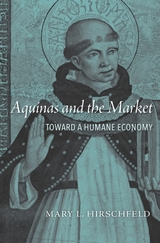
Economists and theologians usually inhabit different intellectual worlds. Economists investigate the workings of markets and tend to set ethical questions aside. Theologians, anxious to take up concerns raised by market outcomes, often dismiss economics and lose insights into the influence of market incentives on individual behavior. Mary L. Hirschfeld, who was a professor of economics for fifteen years before training as a theologian, seeks to bridge these two fields in this innovative work about economics and the thought of St. Thomas Aquinas.
According to Hirschfeld, an economics rooted in Thomistic thought integrates many of the insights of economists with a larger view of the good life, and gives us critical purchase on the ethical shortcomings of modern capitalism. In a Thomistic approach, she writes, ethics and economics cannot be reconciled if we begin with narrow questions about fair wages or the acceptability of usury. Rather, we must begin with an understanding of how economic life serves human happiness. The key point is that material wealth is an instrumental good, valuable only to the extent that it allows people to flourish. Hirschfeld uses that insight to develop an account of a genuinely humane economy in which pragmatic and material concerns matter but the pursuit of wealth for its own sake is not the ultimate goal.
The Thomistic economics that Hirschfeld outlines is thus capable of dealing with our culture as it is, while still offering direction about how we might make the economy better serve the human good.

A comprehensive overview of the contribution of Catholic social thought to business ethics
Can a religion founded on loving one’s neighbor give moral approval to profit-seeking business firms in a global economy? What should characterize the relationship between faith and economic life? What can businesses, employees, and executives do to contribute to the common good and to make their practices and society more ethical?
Business Ethics and Catholic Social Thought provides a new and wide-ranging account of these two ostensibly divergent fields. Focusing on the agency of the business person and the interests of firms, this volume outlines fundamental issues confronting moral leaders and corporations committed to responsible business practices.
The book leads with interviews of three Catholic CEOs and the intellectual history of business ethics in Christianity before examining fundamental moral concerns regarding business: its purpose, autonomy, practical wisdom, and the technocratic paradigm. Contributing authors also consider management science, the motivations of business leaders, the role of luck in personal success, the traditional moral justifications for business, and more. These contributions bring new depth to the application of Catholic social thought to business ethics during a time when economic crisis demands a reevaluation of business and its contribution to society.
READERS
Browse our collection.
PUBLISHERS
See BiblioVault's publisher services.
STUDENT SERVICES
Files for college accessibility offices.
UChicago Accessibility Resources
home | accessibility | search | about | contact us
BiblioVault ® 2001 - 2024
The University of Chicago Press









